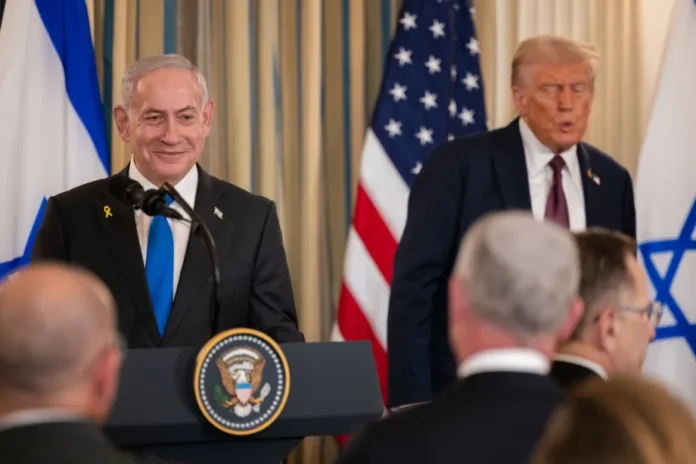A fresh wave of anger has erupted across Arab and Muslim capitals after Israeli Prime Minister Benjamin Netanyahu introduced unexpected changes to the Gaza peace proposal initially presented by U.S. President Donald Trump. The last-minute revisions, made just hours before the plan’s official unveiling, have fundamentally reshaped the timeline and terms of Israel’s withdrawal from Gaza—sparking outrage among Arab leaders who believed they had reached a fragile consensus.
Netanyahu Alters Withdrawal Terms

According to diplomatic sources, Netanyahu successfully pushed for critical amendments that tie Israel’s withdrawal not to a fixed schedule but to specific milestones linked to Hamas’ disarmament. Under the revised terms, Israeli troops could remain in Gaza’s designated security zones indefinitely, with the withdrawal subject to Israel’s own assessment of whether Hamas still poses a threat.
This shift has been perceived as undermining the spirit of the negotiations. Many Arab officials argue that it effectively gives Israel unilateral control over the pace of the process, leaving Palestinians vulnerable to indefinite military presence without clear international guarantees.
Backlash from Arab Powers
Prominent regional players—including Saudi Arabia, Qatar, Egypt, and Turkey—have publicly voiced dissatisfaction with the sudden changes. Behind closed doors, officials criticized Washington for moving forward with the altered document despite repeated appeals for additional time to reconcile concerns.
While frustrated, Arab governments have simultaneously increased pressure on Hamas to accept the deal, arguing that it represents the only viable opportunity to secure an immediate ceasefire and humanitarian relief for the people of Gaza.
Qatari Prime Minister Mohammed bin Abdulrahman Al Thani is reported to have directly urged Hamas leadership in Doha not to dismiss the plan. He emphasized that Trump’s administration appears determined to enforce the agreement and warned that rejecting it could prolong suffering in the war-torn enclave.
Domestic Pushback in Arab Capitals

However, Arab governments face growing criticism at home. Civil society groups and opposition parties accuse them of bowing to American and Israeli demands at the expense of Palestinian rights. Street protests and online campaigns across the region have accused leaders of “selling out” the Palestinian cause, further complicating diplomatic maneuvering.
For governments like Egypt and Saudi Arabia, balancing domestic opinion with international pressure has become increasingly difficult. Analysts note that while these states seek stability and an end to hostilities, public anger could erode their political legitimacy if seen as abandoning Palestine.
Hamas Grapples with Internal Divisions
Within Hamas, sharp divisions have emerged over how to respond to the amended proposal. Some leaders believe that accepting the plan, despite reservations, might open the door to much-needed humanitarian aid and a pathway toward eventual statehood. Others, however, reject the clauses requiring complete disarmament and indefinite exclusion from governance in Gaza.
Senior Hamas officials insist that any genuine agreement must guarantee a full Israeli withdrawal under international supervision. They also oppose the introduction of foreign “stabilization forces,” arguing such measures would strip Palestinians of sovereignty.
U.S. Ultimatum and Rising Tensions
President Trump has issued a stern ultimatum, warning Hamas that it must provide a clear response within days or risk continued military escalation. This deadline has intensified the diplomatic standoff, with Arab capitals scrambling to persuade Hamas while simultaneously expressing frustration over Israel’s last-minute maneuvering.
International observers remain skeptical about the viability of the peace framework. Many argue that Netanyahu’s amendments have deepened mistrust, casting doubt on whether any agreement can be reached in the near future.
Outlook: Uncertain Future for Gaza Peace
As regional leaders attempt to salvage the deal, the future of the Gaza peace process remains highly uncertain. Arab states find themselves caught between U.S. expectations, Israeli security demands, and mounting domestic opposition. Meanwhile, Hamas must decide whether to compromise in exchange for relief or resist and risk prolonged conflict.
What once appeared to be a fragile step toward peace has now become a political storm, with Netanyahu’s changes fueling both international outrage and Palestinian skepticism. For now, Gaza’s fate hangs in the balance—shaped by diplomacy, internal divisions, and the enduring question of trust in a conflict that has defied resolution for decades.

